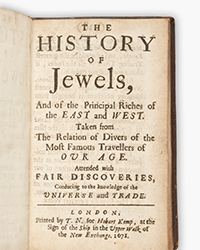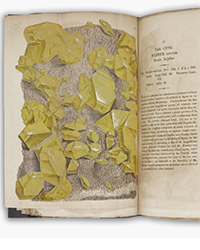Rare Book Monthly
Collecting in the Known and Unknown World
By Bruce McKinney
This is an article written to accompany this month's issue of the Comet - whose focus is Pamphlets, Broadsides and Ephemera.
History is the imprecise masquerading as the certain. Read history and it always contains opinion dressed as perspective because history is not all the facts, it's specific facts selected by writers. To dress up the text and confer credibility the occasional statement of uncertainty is included implying the rest of what's said is "known." What would history look like without perspective? Possibly something like a Google devoted entirely to all of history's disparate facts. It might tell us everything and nothing. Interpretation is that important. But because history is interpretation it is always subjective. It is also immense in scope and thereby provides finite opportunities for the amateur and the interested to understand specific history uniquely, even perhaps better than experts do. Just don't expect to find consistent confirmation of your research in the big books. The popularizer of history, often an adept story teller, employs an impressionistic approach to tell a coherent story that both explains who we were and by extension who we are. The historian looks intensively into the underlying facts and often clarifies, even debunks conventional wisdom. Between them we have the story leaning toward myth and the facts converted into story. The reader is in the middle.
We of course prefer myth masquerading as fact although it says more about us than it does about the past. When we do confront the past, for safety and convenience, we first separate ourselves from it. It isn't us; it's never us. When confronted we most often omit and what we cannot omit we sometimes deny. Our popular histories hence are more comforting than accurate. It's them. It's not us. Throw a thousand grains of sand into the air and see the sparkle of a few. Writers of popular history write of these while the darker grains are left to academics, lost, forgotten and ignored. What Al Gore characterizes as "inconvenient truths" about a planet under siege it turns out is also applicable to our approach to history. In wilfull ignorance we lose much, not just much of the crucial facts but also the opportunity to understand who we were, what we did, and why we did it. The past wasn't necessarily bad but neither will the future be necessarily better unless we come to terms with it.
This is relevant today because it has become possible, even easy, to reconstruct the past from the enormous volume of ephemera of all types - pamphlets, broadsides, newspapers and magazines, that is increasingly visible. The detailed stories that emerge may confirm, deny or elaborate what we believe. The outcome hardly matters. The principal difference is between believing and knowing. We can learn from what we know. We can only hope from what we believe. Anyone with computer access can do it and the scale and scope of such collecting is always under the control of the collector/researcher. The flow of material is constant. The collector engages and disengages and reengages when time permits.
Looking intently into the past will certainly confirm a substantial portion of mainstream historical narrative be it forms of transportation, demographics or attitudes toward alcohol in the 1840s. At the same time, in the details, the story is always different, perhaps true but not true enough. Other aspects of our understanding and expectation will emerge as fiction. What's compelling today is the opportunity to parse the details in ways inconceivable just a decade ago. And it doesn’t require special access and passes. It simply requires imagination, experience and awareness that unknown material regularly crosses our horizon at unpredictable times, is present briefly and disappears quickly. Those who understand and are interested in aspects of this lost history will pursue such material.



![<b>Heritage, Dec. 15:</b> John Donne. <i>Poems, By J. D. With Elegies on the Author's Death.</i> London: M[iles]. F[lesher]. for John Marriot, 1633. <b>Heritage, Dec. 15:</b> John Donne. <i>Poems, By J. D. With Elegies on the Author's Death.</i> London: M[iles]. F[lesher]. for John Marriot, 1633.](https://ae-files.s3.amazonaws.com/AdvertisementPhotos/8caddaea-4c1f-47a7-9455-62f53af36e3f.jpg)
























